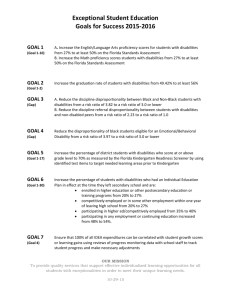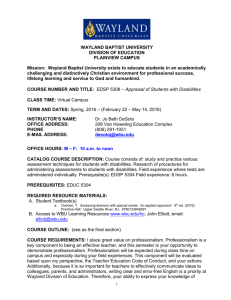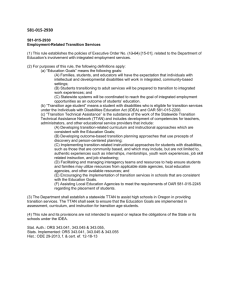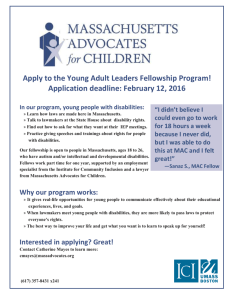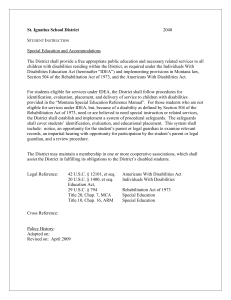Student Learning Outcomes - Wayland Baptist University
advertisement
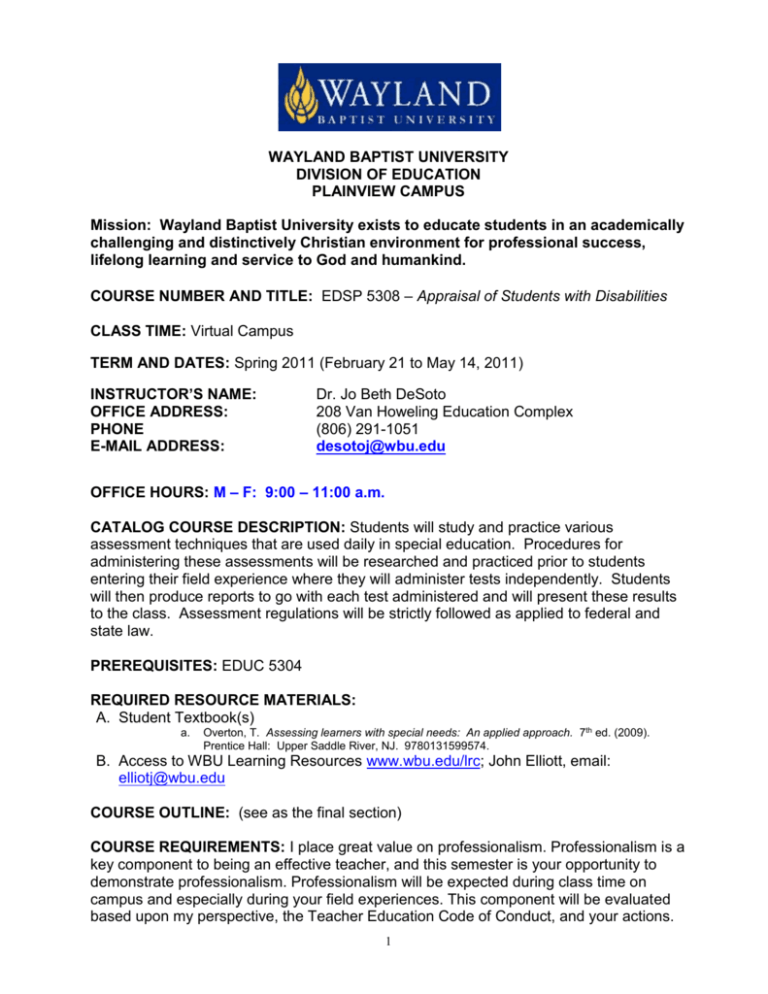
WAYLAND BAPTIST UNIVERSITY DIVISION OF EDUCATION PLAINVIEW CAMPUS Mission: Wayland Baptist University exists to educate students in an academically challenging and distinctively Christian environment for professional success, lifelong learning and service to God and humankind. COURSE NUMBER AND TITLE: EDSP 5308 – Appraisal of Students with Disabilities CLASS TIME: Virtual Campus TERM AND DATES: Spring 2011 (February 21 to May 14, 2011) INSTRUCTOR’S NAME: OFFICE ADDRESS: PHONE E-MAIL ADDRESS: Dr. Jo Beth DeSoto 208 Van Howeling Education Complex (806) 291-1051 desotoj@wbu.edu OFFICE HOURS: M – F: 9:00 – 11:00 a.m. CATALOG COURSE DESCRIPTION: Students will study and practice various assessment techniques that are used daily in special education. Procedures for administering these assessments will be researched and practiced prior to students entering their field experience where they will administer tests independently. Students will then produce reports to go with each test administered and will present these results to the class. Assessment regulations will be strictly followed as applied to federal and state law. PREREQUISITES: EDUC 5304 REQUIRED RESOURCE MATERIALS: A. Student Textbook(s) a. Overton, T. Assessing learners with special needs: An applied approach. 7th ed. (2009). Prentice Hall: Upper Saddle River, NJ. 9780131599574. B. Access to WBU Learning Resources www.wbu.edu/lrc; John Elliott, email: elliotj@wbu.edu COURSE OUTLINE: (see as the final section) COURSE REQUIREMENTS: I place great value on professionalism. Professionalism is a key component to being an effective teacher, and this semester is your opportunity to demonstrate professionalism. Professionalism will be expected during class time on campus and especially during your field experiences. This component will be evaluated based upon my perspective, the Teacher Education Code of Conduct, and your actions. 1 Additionally, because it is so important for teachers to effectively communicate ideas to colleagues, parents, and administrators, writing clear and error-free English is a priority at Wayland Division of Education. Therefore, your ability to express your knowledge of educational concepts and theories within the conventions of academic discourse will be assessed through both oral presentations and written assignments. Criteria for evaluation will be based on both content and mechanics. Integration of information from lectures, readings, discussions, and field experiences will be taken into consideration as will correct and appropriate format and construction. 1. Test Administration – 6 @ 50 points each = 300 2. Test Reports – 6 @ 50 points each = 300 3. Chapter Questions – 11 @ 50 points each = 550 4. Field Experience Journal – 1@ 100 points = 300 TOTAL POSSIBLE POINTS = 1450 1450 1305 1304 1160 1159 1015 1014 870 Less than 869 = = = = = A B C D F Course Outlines and Competencies: Competencies based on Special Education Standards from the State of Texas: Standard V. The special education teacher understands formal and informal assessment procedures and knows how to evaluate student competencies to make instructional decisions. The beginning special education teacher knows and understands: 5.1k state and federal laws (e.g., IDEA, Title I) that require the assessment of the progress of all students toward state standards; 5.2k basic terminology used in assessment (e.g., validity, reliability, norm-referenced assessment, criterion-referenced assessment); 5.3k ethical concerns related to assessment, including legal provisions, regulations, and guidelines regarding unbiased assessment and the use of psychometric instruments and instructional assessment measures with individuals with disabilities; 5.4k criteria used to determine eligibility for special education services; 5.5k the processes used for screening, prereferral, intervention, referral, and determining eligibility for special education services; 5.6k the appropriate application and interpretation of scores, including standard scores, percentile ranks, and age/grade equivalents; 5.7k the purpose, appropriate uses, and limitations of various types of assessment instruments; 5.8k methods for monitoring the daily progress of individuals with disabilities; and 5.9k the reciprocal nature of assessment and instruction and how to evaluate assessment results to design, monitor, and modify instruction for individuals with disabilities; Student Learning Outcomes: 1. The student will read state and federal laws regarding Special Education Assessment, memorizing basic terminology used in these types of procedures and identifying specific ethical concerns regarding such practices. a. Testing Regulations Exams 2. The student will collect data on the various types of assessment instruments available for use by special educators and administer 3 tests to students with disabilities. Upon completion of these tests, the student will then write and present an analysis of the evaluation tool chosen and the test results. a. Test Administration b. Written Report of Test Results c. Class Presentation of Test Results and Reports 2 3. The student will compile a reference list of 15modifications to be used for each of the 13 exceptionalities as defined by IDEA. a. Written Reports Containing Modifications The beginning special education teacher is able to: 5.1s collaborate with parents/guardians and with other school and community personnel involved in the assessment of individuals with disabilities; 5.2s document ongoing student progress and maintain accurate records; 5.3s demonstrate responsiveness to cultural and other factors (e.g., ethnicity, language, religion, gender, personal beliefs, nature and severity of disability) by matching appropriate assessment strategies to the characteristics and needs of individual students; 5.4s gather background information regarding academic, medical, and family history; 5.5s use various types of assessment procedures appropriately; 5.6s interpret information from formal and informal assessment instruments and procedures, including the interpretation of various types of scores; 5.7s report assessment results to individuals with disabilities, parents/guardians, administrators, and other school community personnel using appropriate communication skills; 5.8s use information from teachers, other school and community personnel, individuals with disabilities, and parents/guardians to make or suggest appropriate accommodations/modifications to learning environments; 5.9s develop individualized assessment strategies to evaluate the results of instruction; 5.10s use assessment information to help make instructional decisions and plan individual programs that results in appropriate placement and intervention for all individuals with disabilities, including those from culturally and/or linguistically diverse backgrounds; 5.11s evaluate supports needed for access to the general curriculum and integration into various programs and environments; and 5.12s design ecological inventories, portfolio assessments, task analyses, and functional assessments to accommodate the unique abilities and needs of individuals with disabilities. Student Learning Outcomes: 1. The student will attend a minimum of 3 ARD meetings during their Field Experience and collect notes throughout the procedures, citing parent-teacher-administrator interaction and all types of cultural differences that might be present. a. Field Experience Journal 2. The student will develop 6 individualized assessment strategies to evaluate the results of their personal instruction that will specifically address students with disabilities. a. Individualized Assessments b. Class Presentation of Test Results Course Outlines and Competencies: Competencies based on Educational Diagnostician Standards from the State of Texas: Standard III. The educational diagnostician develops collaborative relationships with families, educators, the school, the community, outside agencies, and related service personnel. (2) The beginning educational diagnostician is able to: (k) keep accurate and detailed records of assessments, evaluations, and related proceedings (e.g., ARD/IEP meetings, parent/guardian communications and notifications). Student Learning Outcomes: 1. The student will develop 6 individualized assessment strategies to evaluate the results of their personal instruction that will specifically address students with disabilities. c. Individualized Assessments d. Class Presentation of Test Results Standard IV. The educational diagnostician understands and applies knowledge of student assessment and evaluation, program planning, and instructional decision making. (2) The beginning educational diagnostician is able to: (b)interpret and use assessment and evaluation data for targeted instruction and ongoing review; and (c) assist in identifying realistic expectations for educationally relevant behavior (e.g., vocational, functional, academic, social) in various settings. Student Learning Outcomes: 3 3. The student will attend a minimum of 3 ARD meetings during their Field Experience and collect notes throughout the procedures, citing parent-teacher-administrator interaction and all types of cultural differences that might be present. a. Field Experience Journal 4. The student will develop 6 individualized assessment strategies to evaluate the results of their personal instruction that will specifically address students with disabilities. a. Individualized Assessments b. Class Presentation of Test Results Standard V. The educational diagnostician knows eligibility criteria and procedures for identifying students with disabilities and determining the presence of an educational need. (2) The beginning educational diagnostician is able to: (a) access information on the cognitive, communicative, physical, social, and emotional characteristics of individuals with disabilities; (b) gather background information regarding the academic, medical, and family history of individuals with disabilities; and (c) use various types of assessment and evaluation procedures appropriately to identify students with disabilities and to determine the presence of an educational need. Student Learning Outcomes: 5. The student will attend a minimum of 3 ARD meetings during their Field Experience and collect notes throughout the procedures, citing parent-teacher-administrator interaction and all types of cultural differences that might be present. a. Field Experience Journal 6. The student will develop 6 individualized assessment strategies to evaluate the results of their personal instruction that will specifically address students with disabilities. a. Individualized Assessments b. Class Presentation of Test Results Standard VI. The educational diagnostician selects, administers, and interprets appropriate formal and informal assessments and evaluations. (1) The beginning educational diagnostician knows and understands: (a) basic terminology used in assessment and evaluation; (b) standards for test reliability; (c) standards for test validity; (d) procedures used in standardizing assessment instruments; (e) possible sources of test error; (f) the meaning and use of basic statistical concepts used in assessment and evaluation (e.g., standard error of measurement, mean, standard deviation); (g) uses and limitations of each type of assessment instrument; (h) uses and limitations of various types of assessment data; (i) procedures for screening, prereferral, referral, and eligibility; (j) the appropriate application and interpretation of derived scores (e.g., standard scores, percentile ranks, age and grade equivalents, stanines); (k) the necessity of monitoring the progress of individuals with disabilities; (l) methods of academic and nonacademic (e.g., vocational, developmental, assistive technology) assessment and evaluation; and (m) methods of motor skills assessment. Student Learning Outcomes: 4. The student will read state and federal laws regarding Special Education Assessment, memorizing basic terminology used in these types of procedures and identifying specific ethical concerns regarding such practices. a. Testing Regulations Exams 5. The student will collect data on the various types of assessment instruments available for use by special educators and administer 3 tests to students with disabilities. Upon completion of these tests, the student will then write and present an analysis of the evaluation tool chosen and the test results. a. Test Administration b. Written Report of Test Results c. Class Presentation of Test Results and Reports 6. The student will compile a reference list of 15modifications to be used for each of the 13 exceptionalities as defined by IDEA. a. Written Reports Containing Modifications 4 Standard VIII. The educational diagnostician knows and demonstrates skills necessary for scheduling, time management, and organization. (2) The beginning educational diagnostician is able to: (a) select, adapt, or design forms to facilitate planning, scheduling, and time management; (b) maintain eligibility folders; and (c) use technology appropriate to organize information and schedules. Student Learning Outcomes: 7. The student will read state and federal laws regarding Special Education Assessment, memorizing basic terminology used in these types of procedures and identifying specific ethical concerns regarding such practices. a. Testing Regulations Exams 8. The student will collect data on the various types of assessment instruments available for use by special educators and administer 3 tests to students with disabilities. Upon completion of these tests, the student will then write and present an analysis of the evaluation tool chosen and the test results. a. Test Administration b. Written Report of Test Results c. Class Presentation of Test Results and Reports 9. The student will compile a reference list of 15modifications to be used for each of the 13 exceptionalities as defined by IDEA. a. Written Reports Containing Modifications Standard X. The educational diagnostician knows and understands appropriate curricula and instructional strategies for individuals with disabilities. (2)The beginning educational diagnostician is able to: (a) interpret and use assessment and evaluation data for instructional planning; and (b) use assessment and evaluation, planning, and management procedures that are appropriate in relation to student needs and the instructional environment. Student Learning Outcomes: 1. The student will read state and federal laws regarding Special Education Assessment, memorizing basic terminology used in these types of procedures and identifying specific ethical concerns regarding such practices. b. Testing Regulations Exams 2.The student will collect data on the various types of assessment instruments available for use by special educators and administer 3 tests to students with disabilities. Upon completion of these tests, the student will then write and present an analysis of the evaluation tool chosen and the test results. c. Test Administration d. Written Report of Test Results e. Class Presentation of Test Results and Reports 3.The student will compile a reference list of 15modifications to be used for each of the 13 exceptionalities as defined by IDEA. f. Written Reports Containing Modifications ATTENDANCE POLICY: 1. Student must call [(806) 291-1051] or email [desotoj@wbu.edu] the professor when experiencing problems logging onto Blackboard or with completing assignments.l. METHODS OF INSTRUCTION: The delivery system for the course will consist of face-toface instruction supplemented by Blackboard interactions. In an effort to accommodate the specific needs of students, instructional methods may include, but will not be limited to, the following: lectures, small group interactions, discussion groups, cooperative learning, peer reviews, presentations, demonstrations, practice, and observations. 5 Independent study and reading are essential elements of this course because each student will construct an individualized Unit for future use in the classroom. EVALUATION: University Grading System: A 90-100 B 80-89 NCR C 70-70 I D 60-69 W F below 60 WP WF X IP Cr for Credit No Credit Incomplete* for withdrawal Withdrawal Passing Withdrawal Failing No grade given In Progress A grade of “CR” indicates that credit in semester hours was granted but no grade or grade points were recorded. *A grade of incomplete is changed if the work required is completed prior to the date indicated in the official University calendar of the next long term, unless the instructor designates an earlier date for completion. If the work is not completed by the appropriate date, the I is converted to the grade of F. An incomplete notation cannot remain on the student’s permanent record and must be replaced by the qualitative grade (A-F) by the date specified in the official University calendar of the next regular term. COURSE GRADING CRITERIA: All assignments are due as noted on course calendar unless otherwise announced in class. All assigned work must be word processed. Assignments not completed on time will reflect a lowered grade of 10% deduction per day minimum. Late work will not be accepted after 7 calendar days. If a student missed class the day an assignment is due, he or she must still turn in the assignment no later than the regular class meeting time to receive possible full credit for the assignment. Test Administration Test Reports Field Experience Journal TOTAL POSSIBLE POINTS 300 6 @ 50 each 6 @ 50 each 1 900 300 300 900 ACADEMIC HONESTY: University students are expected to conduct themselves according to the highest standards of academic honesty. Academic misconduct for which a student is subject to penalty includes all forms of cheating, such as illicit possession of examinations or examination materials, forgery, or plagiarism. (Plagiarism is the presentation of the work of another as one’s own work). Disciplinary action for academic misconduct is the responsibility of the faculty members assigned to the course. The faculty member is charged with assessing the gravity of any case of academic dishonesty, and with giving sanctions to any student involved. Penalties may be applied to individual cases of academic dishonesty; see catalog for more information about academic dishonesty. 6 PERSONS WITH DISABILITIES: It is University policy that no otherwise qualified person with disabilities be excluded from participation in, be denied the benefits of, or be subject to discrimination under any educational program or activity in the University. It is the responsibility of the student to disclose and to provide documentation pertaining to the disability so that appropriate modifications may be made. MEETING TIMES, DATES AND ASSIGNMENTS: Students are required to log onto Blackboard at least 3 times weekly and complete weekly assignments. 7 EDSP 5308 (Virtual Campus) Tentative Course Outline—I reserve the right to amend the tentative course outline as needed during the course.٭ Date/Week Classwork Reading Assignment M Feb 21 Introduction – Syllabus Read Ch. 1 & 2 *Discussion Questions M Feb 28 An Introduction to Assessment Laws, Ethics, and Issues Read Ch. 3 & 4 *Discussion Questions M Mar 7 Descriptive Statistics Reliability and Validity Read Chapter 5 *Discussion Questions *Begin Field Experience Journal *Administer Test #1 & Write Report Mar 14 – 20 M Mar 21 Spring Break Norm-Referenced Assessment Read Chapter 6 *Present Test #1 Results *Discussion Questions *Continue Field Experience *Administer Test #2 & Write Report M Mar 28 Curriculum Based Assessment and Other Informal Measures Read Chapter 7 *Present Test #2 Results *Discussion Questions *Continue Field Experience Journal *Administer Test #3 & Write Report M Apr 4 Academic Assessment Read Chapter 8 *Present Test #3 Results *Discussion Questions *Administer Test #4 & Write Report M Apr 11 Assessment of Behavior Read Chapter 9 *Discussion Questions *Administer Test #5 & Write Report M Apr 18 Measures of Intelligence and Adaptive Behavior Read Chapter 10 *Discussion Questions *Administer Test #6 & Write Report *Complete Field Experience Journal M Apr 25 Special Considerations of Assessment in Early Childhood and Transition Read Chapter 11 *Discussion Questions *Continue Field Experience Journal M May 2 Interpreting Assessment for Educational Intervention *Complete all test reports and submit. *Revise any test reports as needed. M May 9 *Post Field Experience Journals No Later Than May 10th, 2011. 8 Products Due Next Session *Begin looking for a site to administer tests.



